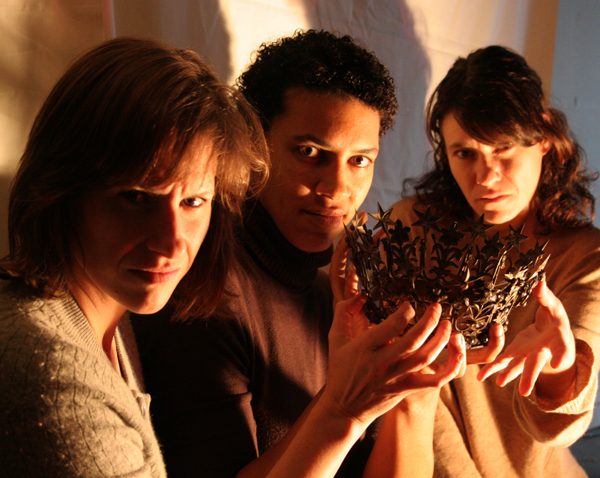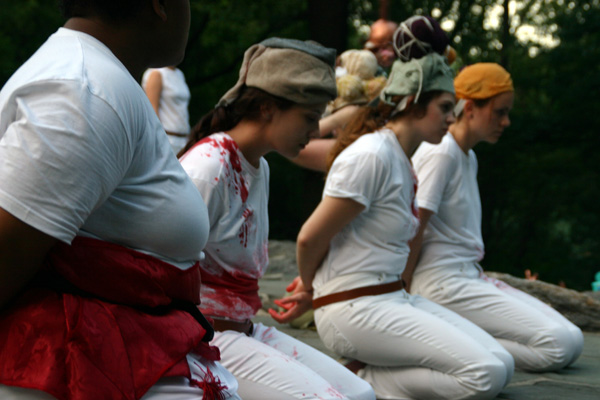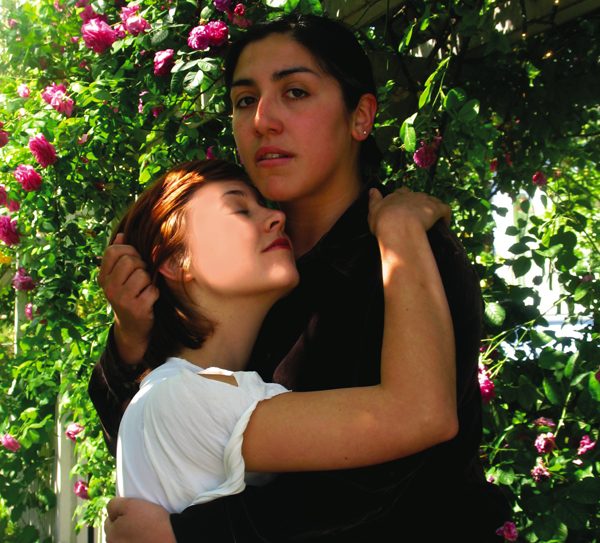This theater company queers their audiences’ perspective on the bard with their all-female casts.
There’s always been something queer about staging Shakespeare, with the plays’ cross-dressing heroines and shades of 16th century stages where young boys were dressed as women. Increasingly, modern theater companies are exploring and expanding the gender-bending subtext of Shakespeare’s plays with all-female companies and adaptations laden with provocative gender-queer subtext that, slowly but surely, is cracking the multiple glass ceilings that still hang over the world’s busiest stages.
But now a funding crisis in the art world threatens to silence those unique voices just as a new generation of women stands to inherit the benefits of gains made over the last 20 years.
When Erin Merritt founded Woman’s Will, San Francisco’s all-female Shakespeare company, in 1998, she didn’t set out to make political statements or redefine the way people look at Shakespeare’s oeuvre. At first, all Merritt wanted was to tap into a vibrant creative community that, at the time, lacked any kind of channel to work in. “I had no intention of starting a company, and I had no intention of doing at all myself,” Merritt says. “I just started looking around and thinking, I want to work with these women instead of competing against them.”
Because women’s roles on the Elizabethan stage were played by boys and because there were only a few boys in each company, there are only a handful of women’s parts in any given period play.
As a Bay Area actor, Merritt ended up jostling dozens of other women all gunning for the same few parts, and almost never got to collaborate with any of them. “We’d have 50-100 women up for one role, and at those numbers it’s random who gets cast,” Merritt says. “They’re going to cast the men first and then figure out who looks good with them.” So Merritt floated the idea of doing an all-female production and found enthusiastic support from every party.
Though she hadn’t meant to set herself up as an organizer, she realized that once she’d put the idea out there someone was eventually going to do it, and if she didn’t take the helm she might get left out. From there, in fits and starts, one production at a time, Woman’s Will was born.
Merritt and company only wanted to make work and create a particular creative environment for women actors and technicians, not to make sweeping social commentary about gender. But, somehow, social and political commentary emerged in the productions anyway.
Woman’s Will decided to stage Coriolanus simply because “A lot of us had a lot of stage combat training that we never got to use,” Merritt says. After the premiere, a fight choreographer approached her and commented on how the production changed the way he thought about his job: “He told me, ‘I loved the way you fight, but I started thinking, why are they fighting anyway, why aren’t they just talking it out? And then I thought, I would never ask that about men. Why is it that I expect men to fight and expect women to talk?’ And he had this absolute epiphany that he’d been staging around stereotypes his entire life.”
Epiphanies about gender and sexuality became common at Woman’s Will. As an experiment, the company staged a reverse-gender production of Measure for Measure, with men in the women’s roles and women in the men’s. “It was kind of great seeing a pregnant man onstage,” Merritt says. “But then I saw this man playing a woman being [sexually] harassed by a woman playing a man. The person being harassed is so much bigger and stronger and I wondered why he doesn’t speak up? But then I realized it wasn’t about physical power.”
Whether she meant to or not, Merritt’s productions were breaking taboos, breaking stereotypes and redefining how audiences reacted to the plays. It was a surprise for Merritt, but other stage adepts say she should have expected it. Five years before Merritt founded Woman’s Will, Lisa Wolpe founded the Los Angeles Women’s Shakespeare Company. Unlike Merritt, Wolpe recognized the political ramifications of her productions right away. In fact, that was the whole point. “The plays were written for gender-bending,” Wolpe reminds us. “Gender means physical gender, but it’s also perception of what you believe gender means.” Change the basic trappings of gender onstage and you change the way your audience thinks not only about the characters but about all the real-life issues the play grapples with. “A woman playing a fellow is not going to present it in the same way as a man. A woman slapping Desdemona is just not going to be perceived the same way,” Wolpe says. “If you can send someone home talking about a female Hamlet or Othello, that will be the beginning of important conversation about gender and about what is talent and opportunity.”
Wolpe wanted to explore and expand the potential queer overtones of Shakespeare’s plays right out the gate. The very first show the LAWSC put on was an all-female Romeo & Juliet. Why that play? “I think because I’m gay and the theme of passionate love in a world that won’t tolerate it appealed to me,” Wolpe says. “Two young people are in love, and others won’t allow it because the other people are more interested in their hatred,” she continues, remarking how the elements of the play resonated with experiences growing up gay in the ’60s. “Juliet’s running away from her family, Rosalind [in As You Like It] is running away from her family,” because the families simply can’t accept the reality of these teenage characters’ romances.
“Don’t be naïve and say that you’re shocked that someone got political and sexual [with Shakespeare],” says Lue Douthit, director of literary development at the Oregon Shakespeare Festival, where Wolpe is working this season. “Theater is a political act by its nature. I am asking you to listen to my point of view on stage, it doesn’t take an election year to get that.” Douthit is not surprised to hear that Woman’s Will couldn’t help but make a statement with each new production. That’s just the nature of theater, she says. “Walking around and talking with a point of view, that’s a political act, and it’s a sexual act. It’s bodies moving in space, men’s bodies or women’s bodies.”
A prime example is one of OSF’s June productions, The Very Merry Wives of Windsor, Iowa, an adaptation of Shakespeare’s The Merry Wives of Windsor, this one in a contemporary setting and with the genders and orientations of some of Shakespeare’s characters flipped to reflect Iowa’s landmark decision legalizing gay marriage. The play, by Alison Carey, is more than just an amusing inversion, says Douthit, it’s a premeditated election-year commentary using Shakespeare’s most socially conscious work. “Alison wanted to match the commentary that’s already built into the play and figure out what the contemporary equivalent of it might be,” Douthit says. “There’s a huge social and class statement that’s being made.”
“It’s now about lesbian marriages,” Lisa Wolpe said of Carey’s play. “In this version, the daughter’s big embarrassing revelation is that she’s straight and doesn’t want to marry any of the lesbian suitors [her mothers] have set up for her. To see a lesbian story on stage, in a play directed by a gay man, I think we’re beginning to understand the fabric of what’s possible” on the modern stage.
Once someone is committed to using Shakespeare to explore society’s gender boundaries, how do they go about perfecting that craft? In the early days of Woman’s Will, Erin Merritt decided to call in an expert. “We had a drag king, Leslie Einhorn — she performs under the name ‘Arty Fishal’ — come in and train everybody,” Merritt says. Einhorn teaches drag lessons to both trans women and women who are just curious about “learning to swagger,” but working with the actors of Woman’s Will was a little trickier.
“Sometimes, with more feminine women, there was a discomfort where they couldn’t fully commit to the character,” Einhorn says. “They had never played around with gender. The social constructs start from day one with the baby, and people are very attached to their genders. When they’re asked to let go of it, it can really rock their world.”

Julia Mitchell (from left),Leontyne Mbele-Mbong and Treacy Corrigan in Macbeth (photo credit: Elizabeth Allen)
Up until that point, Merritt had consciously avoided having any of the actors use makeup or artificial facial hair to physically impersonate men on stage, but Einhorn thought a little drag session might be the perfect way to get the cast to inhabit their roles. “One woman in particular had been working with Woman’s Will for a while but she had never done facial hair or packing, and that brought something else out of her,” Einhorn says. “She put on some sideburns and a goatee and when she looked in the mirror she said, Oh my God, I look like my brother! That helped her tap into these different men in her life. It was a breakthrough for her.”
The effects of Einhorn’s lessons were noticeable right away. “In our production of Hamlet, with my Hamlet and my Laertes, people really did forget that they were female,” Merritt says. Though most in the company opted not to go on stage in drag even after working with Einhorn, Merritt says their performances were so remarkable that even close friends of the lead did not recognize her face on the poster. The illusion was so compelling, Merritt says, that most of the time the audience would forget who they were really watching. “They’d take off their jackets to fight, and as soon as they take off their jackets you see breasts and you remember, Oh yeah, they’re women…and they’re kind of hot! The whole audience went ‘Whoa,’ and you have to take a moment to readjust.”
Sometimes broadening the audience’s horizons is just a question of which play to perform. Sarah Eismann, a former member of Woman’s Will who went on to found the all-female Manhattan Shakespeare Project, talked about the danger of being marginalized and typed when planning MSP’s inaugural production: “It would be really easy to do A Midsummer Night’s Dream or As You Like It. We would instantly have an audience,” Eismann says. “But I don’t want people to say, Oh, isn’t that cute, women doing Shakespeare in the park!”

Alexandra Petrova as Lavinia in Titus Andronicus (photo credit: Sarah Eismann)
Instead Eismann put on Titus Andronicus, a gruesome tragedy featuring rape, cannibalism, racism and ritual human sacrifice. No one was going to accuse the Manhattan Shakespeare Project of being “cute.” “We said, we could do Titus Andronicus,” says Eismann. “And I said, Wow, that’ll be hard. We would have to get past the stereotype of women and violence. We were very lucky that we found a cast who was very brave and very courageous and was willing to go places with the text. We used just shy of a gallon of blood every performance. The laundry bill was enormous.”
Some insiders say that even in the liberal, gay-friendly world of professional theater there is still a stigma about what women do on stage. “One thing about being female and about being queer is noticing what kind of marginalization there is for queer women,” Lisa Wolpe says.
Hana Kadoyama, an assistant dramaturge on The Very Merry Wives of Windsor, Iowa, says that the realities of the theater world have given her culture shock. “I just graduated from Smith College, maybe the queerest women’s college on the planet. It’s been a huge shock going out into the real world and realizing queer women are much more of a minority than I’ve lived with,” Kadoyama says. Sure, theater is diverse, says Kadoyama, but sometimes that creates a bubble. “The dominant regional theater sensibility is more rooted in this mindset of gay men, straight women, and so forth,” she says. “Lesbians are becoming invisible because there’s this idea that because we’re surrounded by multiculturalism that the battles are won, and that’s just not so. I feel like my generation is more rooted in a general queer sensibility.”
Though Kadoyama cites Alison Carey’s Windsor and groups like Wolpe’s LA Women’s Shakespeare as havens for that queer sensibility, wilting funding for the arts threatens to mute queer voices. Woman’s Will cancelled their 2012 season, in part because of trouble securing funding. “We used to get a lot of philanthropy from startup companies, but as those started to fold that doesn’t leave a lot,” said Victoria Erville, who took over as artistic director of Woman’s Will in 2011. Even donations from the audience during Shakespeare in the Park productions dwindled with the trying economic times. “Three years ago we would get $500 to even $1000 per show, but the year before last we were down to $200. People who used to give $20 were just giving $5, or $2,” says Erville.
“My company might fold this year, too,” Lisa Wolpe says of LAWSC. “No matter how fabulous we are we’re not getting the funding that everyone else is getting. There are certainly more gay men succeeding in theater than gay women,” she adds.
Sarah Eismann says that she’s had better luck funding Manhattan Shakespeare through educational programs, but calls funding for general productions “extremely difficult.”
Funding for the arts has always been scarce, but the recession reduced cash flow to a trickle. Because all-female and queer-centric theater groups tend to be small and regional, they’re likely to be the earliest casualties of hard times. “Our arts strategy that we launched last year is designed toward pushing small companies toward trying new things to stay alive,” says Ray Delgado of the James Irvine Foundation, a California-based organization dedicated to funding non-profit groups, including theater groups. The foundation cites a 2011 UCLA study that shows 15 percent of California non-profits disbanded in the last 10 years; chilling numbers for small, struggling groups like Woman’s Will and LAWSC.
Larger institutions are better able to weather the storm, but they may not be able to offer the same diverse perspective. Many theater buffs were horrified when the influential Guthries Theater in Minneapolis recently announced a 2012-2013 season consisting almost exclusively of plays written and directed by white men. Guthries spokesperson Quinton Skinner says that the early lineup announcement does not reflect the full season and that the perceived lack of diversity is a statistical fluke taken in context with Guthries’ seasons of the past. But the 2012 season has still become a sticking point for those who fear that the economic slump may smother certain voices.
Theater, as any of these women will testify, is political by nature, and every production makes a statement. Losing the voices of women who put a new inflection on the classics would diminish the cause of equality. “All-female Shakespeare is not just a gimmick, it’s not something for moms who are failed actresses,” says Lisa Wolpe. “You can see that classic love story [Romeo & Juliet] but you can also see that women can have that incredible sexual attraction for each other. Or if someone sees a beautiful black woman on stage playing Hamlet and says to themselves, ‘Wow, I’m a young black woman, I could play Hamlet too,’ you create an example for other people in the community. The audience changes.”
“Theater is a safe place to have a public conversation,” says Lue Douthit. “People can, in a very democratic way, decide who gets on stage and who gets a voice. We can’t lose that.”
Though Douthit says she believes that since female and queer productions grew out of necessity that new ones will likely emerge to take the place of any that fall by the wayside, the theater world can never have too many venues for a woman’s voice. After all, “What do we mean by a woman’s voice?” asks Lisa Wolpe. “All women have different voices.”
